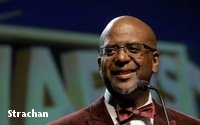
At the end of the day, the color of money is green. "There is no
African-American money. There is no Hispanic money. No Asian money. We all have American green dollars," says Diageo-North America's Marc Strachan. "When I fly, I don't go to the African-American
airport."
During a lively debate during Ad Week 2016, Strachan, Walter Isaacson's Aaron Walton, GroupM Multicultural's Gonzalo Del Fa, Epoch Media Group's Pamela Tsai, and Omnicom's Tiffany Warren
joined The Cipher Group's David Jones to discuss whether multicultural agencies are still needed in today's landscape. And who makes that decision?
"We are focused in an industry that prides
itself on its micro targets," says Walton. "Let's put it in the same pot and not think about it. There is a reason you have to market based on culture."
Panelists express differing opinions on
who is guiding this debate: the multicultural shops or general market agencies? "We do need to control this conversation because words are powerful," says Strachan. "Total market really means
everybody. But we aren't controlling this conversation." Adds Jones: "Those that control the language of the land, control the land."
advertisement
advertisement
Multicultural shops convey mixed messages about their
roles. They want to be considered as general market purveyors and at the same time want to be recognized as segment experts. "We complain all the time that many clients think about African-American,
Hispanic, Asian as an isolated effort and then we isolate ourselves," they say. "We need to sit down at the grown up table [or] we need to stop complaining that it is too far away."
The
realities of the ad business define total market as "getting my fair share of the right audience to drive my business accordingly." Money seems to override color or gender. Yet, others point out that
clients set budgets with an either-or mindset rather than both. For his part, Diageo's Strachan predicts multicultural shops may follow a similar path of the Negro league baseball. They were separate
until the major league started borrowing their players and eventually they become one and the same.
Nonetheless, this debate is more than just advertising, say the panelist. It's talking about
things that make people uncomfortable. Why does CVS still have a black hair aisle? Why do people ignore the nuisances within each group? Why are some segments more accepted to target than others?
Diageo's research finds that gay men drink three times more vodka than straight men. And two and half times more tequila than straight men. He wanted to double down on advertising to gay men, but
people in control find that "is uncomfortable," says Strachan. "This is where the growth is. Double down drive value, help client succeed where you can." Yet it seems brands are willing to leave money
on the table simply to avoid talking about certain demographics.